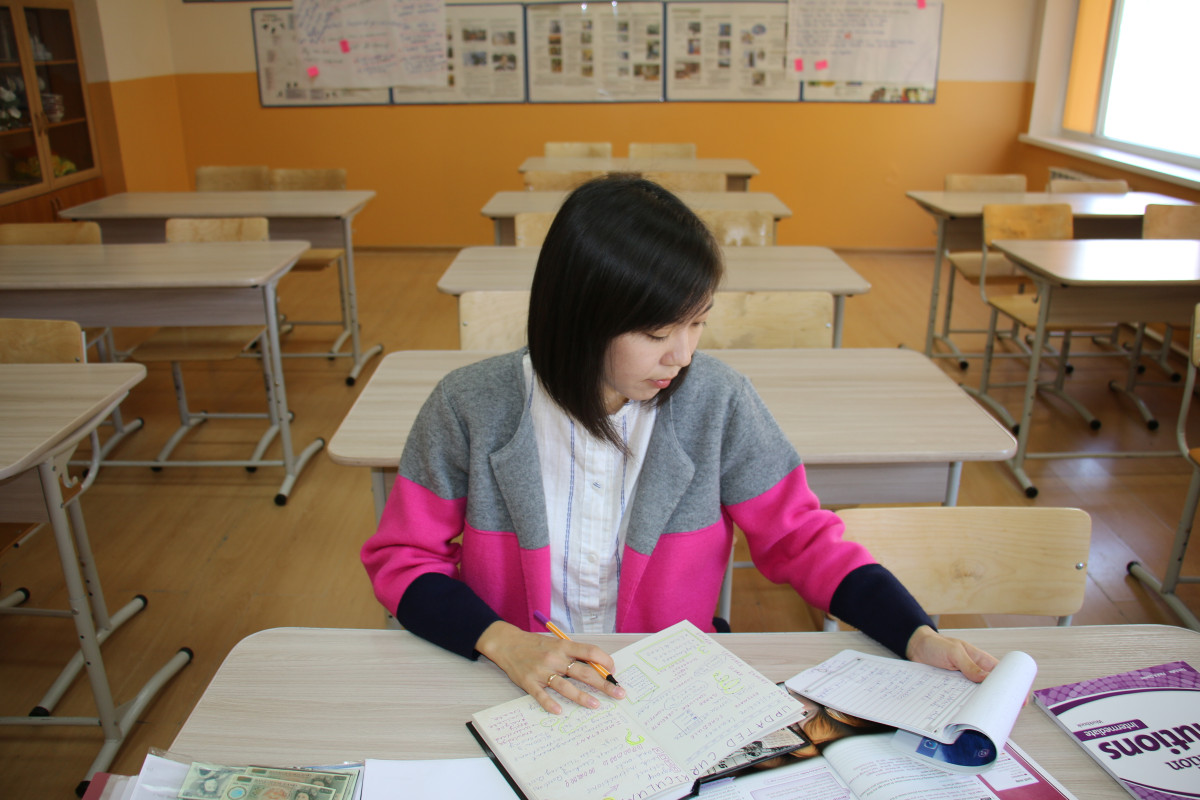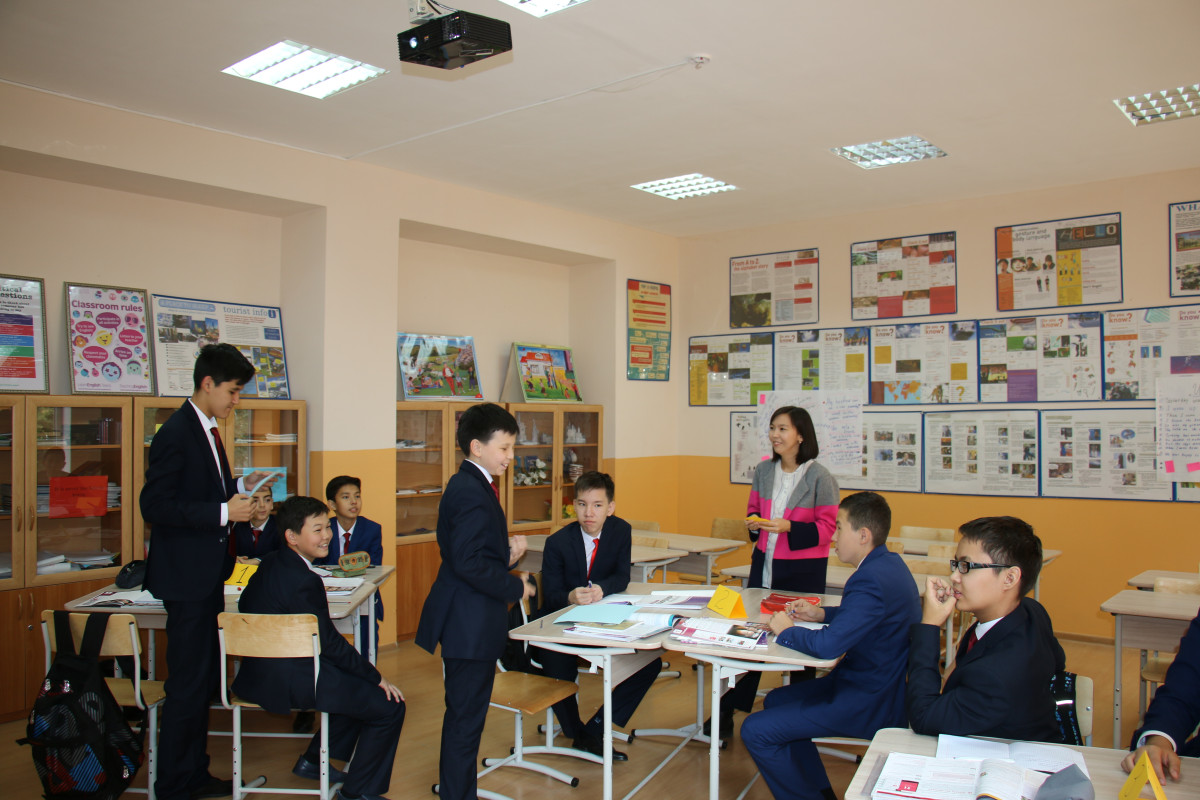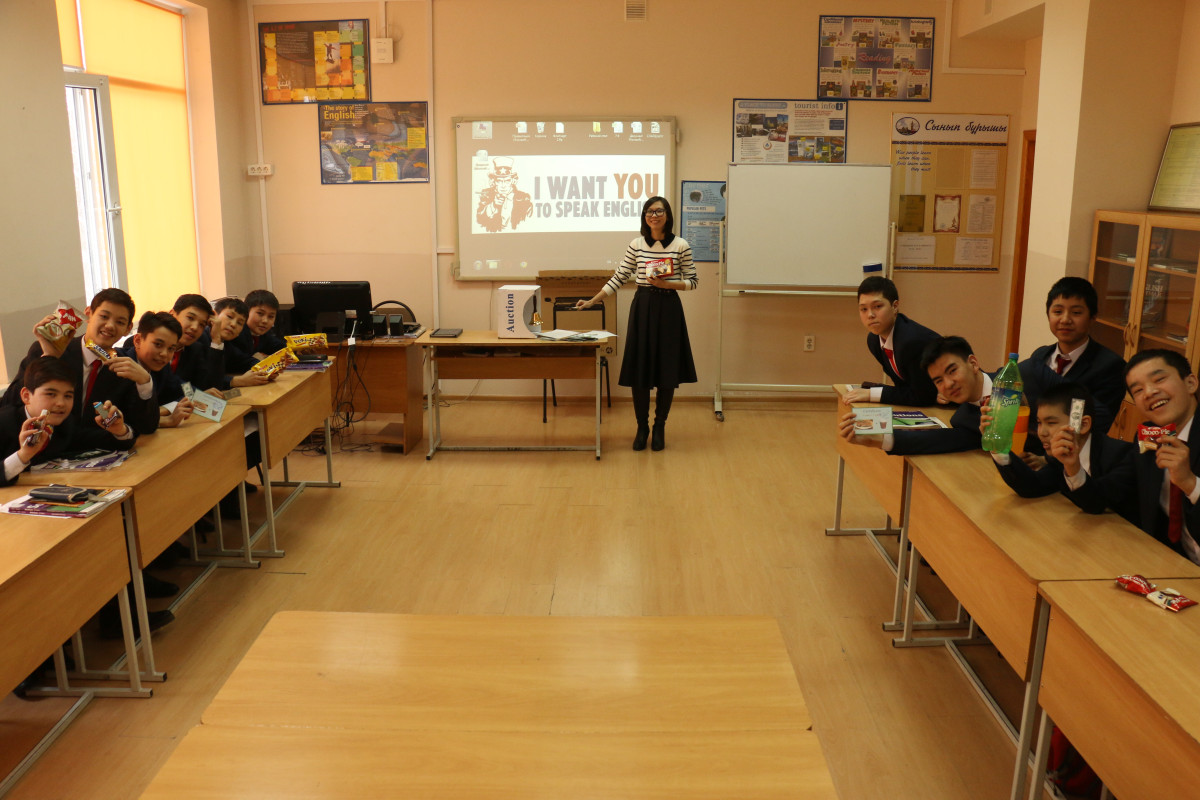The day that changed my life. The story of one teacher
One of them - Ayash Myrzabekova - English teacher in «Bilim Innovation Lyceum» in Pavlodar
The profession of a teacher in modern Kazakhstani society in most cases seems to be something ordinary, trivial and very far from any modernization. Among the headlines of the media, screaming about the plight of students and teachers, it is difficult to find truly inspiring stories about the unique representatives of this truly noble profession.
Nevertheless, in Kazakhstan schools, you can find quite a lot of interesting, talented and even outstanding specialists who break every year the stereotypes formed among the teachers. One of them - Ayash Myrzabekova - English teacher in «Bilim Innovation Lyceum» in Pavlodar. The young initiative teacher keeps pace with the times and applies in practice all new approaches and teaching methods, where there is room for digital technologies. How the teacher copes with his work and inspires his students, read in the material of EL.KZ portal.

From the first person
While studying at the second year of the magistracy, in the high school where I am currently working was urgently needed a replacement for a teacher. Through acquaintances in the Lyceum, they have known that I have an IELTS (International English Language Testing System) certificate, so I was called for an interview. When I entered the Lyceum and saw this atmosphere, the children, then unexpectedly even for myself, I decided to agree with this position. Now I am very grateful to everyone who is involved in my invitation for the interview because for me it really became a dream job.
I perfectly remember my first lesson, even the date, it was February 9th. Before we get started, we - teachers in the Lyceum have carried out demo-lessons, that means the trial lessons, where more experienced colleagues provide feedback. Then on my first lesson, I have prepared special badges for the children. So at me, it turned out at once to establish with them confidential relations, addressing to everyone by name. And at the end of the lesson, we played a little game.
After the lesson, my colleagues gave very valuable advice and talked about the techniques and skills for managing students in the class. For example, I learned about such things that I myself encountered in school. Do not necessarily stand in one place, you can go to the end of the room to attract the attention of children. Use the change of intonation, say somewhere loud, then say so quiet and so on. I really liked that already during the first lesson the children were in a good mood, I felt respect and enthusiasm for studying. Such an atmosphere is what I work for.
Since everything at school was new for me, in the first year of work, I simply filled up my colleagues with questions and asked them to share their professional secrets. Later, I took several courses on work with teenagers who are considered mandatory for every English teacher, such as OTA (Oxford Teaching Academy) and CTS Secondary (Career & Technology Studies), TKT (Teacher’s Knowledge Test), because knowledge of the theory and methodology for determining the added confidence.
My family divided into two camps: someone thinks that the work of a teacher is an ungrateful occupation, and I could better apply my knowledge in other areas of activity, but there are those who are happy for me since I do what I love.
All students should have equal access to additional lessons
Now I teach English in grades 7 to 9. With students of 10 grade, we have our IELTS-club, where we deal with students and prepare for international exams. This project is implemented within the framework of our school, so that all students have equal access to additional classes so that they do not have to find their own tutors, spend time on the road after the lessons, we decided to organize everything here in the Lyceum.
Working with children brings me a lot of joy
Now in the whole world, there has come a certain crisis of the family and, of course, this has a strong effect on adolescents.Yes, I have students who have certain difficulties, for example, because of the divorce of their parents. But this does not mean that they have any problems with their behavior. They are just students who need more communication and attention from the teacher. There is such an expression with which I more than agree: "Children who are loved at home come to school to study, and children who are not loved at home come to school to be loved." We build relationships with these children, somehow direct them, try to help, talk. And when I see that these children become more cheerful, confident in themselves, when they come alive, I really feel that I'm not just working at the school, that this work makes sense, and it brings me a lot of joy.

Digital natives
We use digital technologies in lessons with senior classes because we are striving to go beyond the textbooks and the calendar plan. The development of 21st-century skills, such as digital literacy, ability to speak, debate, think critically, academic writing is an integral part of our lessons. For me, smartphones do not seem to be problematic. It is in English classes that it is very easy to integrate technology with language learning. We have, for example, have their own group in a telegram, where we make tests using bots, conduct research, online survey to Google Forms and Survio. All teenagers are interested in technology, they are called “Digital Natives”, then there are children who are accustomed from childhood to the digital society. And if the teacher can somehow bring these technologies into his lesson, I think everyone will benefit from this.
Grit - it is perseverance, a thirst for knowledge, a desire to learn
But if you look at a smartphone as a problem, it seems to me that everything depends on the relationship between the teacher and the student. If among them there is a trusting and respectful relationship, and I think the student would never use the phone for any purpose other than educational. I adhere to such a position that the teacher can always agree with the student about certain things.
My philosophy on this subject is very simple. For example, I appeal to my students. I think teachers will never have conflicts with students if there is mutual respect.
If the teacher does everything possible to make his lessons interesting, come up with new projects every year, use new methods, then the students will not be forced to wait for feedback. In English, there is such an interesting word «grit», which means perseverance, thirst for knowledge, the desire to learn. This is an indescribable feeling when you have an atmosphere in your classroom when all the children are learning, involved in the learning process, everyone is working and their eyes are burning.
I appreciate the openness in everything that concerns my students. Let's say, the door to the office I always leave open, the parents of children at any time can come and see how the lesson, but still prefer to negotiate with all the disciples themselves, I think it makes them more responsible.
The material component of the work
If a person is a professional in his or her business, investing in himself and in his development, then he will never have problems with finances. I believe that this is a personal choice for every person: to have the thinking of a poor or rich man.
If the teacher invests in his development, then he will have attendant prestige, status, and respect from colleagues and students.And most importantly, he will always have a choice and independence.
Perhaps someone will say that it's easier for me because I work in a specialized Lyceum for gifted children. But the reality is that to be the teacher is difficult in any country: the United States, in England, in Kazakhstan and in secondary school, and in NIS (Nazarbaev Intellectual Schools). I would like more people to come to our profession not for lack of alternatives, but for vocation.
I am very interested in Finland's breakthrough in education, it took them more than 30 years to change the public consciousness, but everyone sees their results now. To be a teacher in Finland is prestigious because it is very difficult to become a teacher, you have to study for many years, be in the top of the students while studying at the university, successfully pass interviews and internships at school. Thanks to the improved quality of teacher training, they are more trusted and the Finns have the opportunity to finance schools and the development of teachers, reducing the number of inspection bodies, and giving more independence to teachers. I think we also need such a transformation of public consciousness, as a result of which people will start to think not about what the state should give them, but about how they can help the state.
Now I read the book "Feed" of the most authoritative psychologist in the world Mihaly Csikszentmihalyi. He writes about what makes people happy. He scientifically proved that we are happier not at leisure, but at work, and determined two factors that affect the feeling of happiness. First, it is the ability to find joy in ordinary moments of life. Second - the work should be meaningful. If a person has a job in which he sees the meaning, clearly realizes his mission, he will, in any case, be happier.
Perhaps we, teachers, need to start reforms with ourselves and be more self-educate, organize seminars for our colleagues, create a communication platform for the exchange of experience, be proactive.
It's easy to be a teacher if you do not like your profession
There is such an expression "It's easy to be a teacher if you do not like your profession" because there are a ready-made calendar plan, textbooks, and programs. That is, all that is required of teachers is to follow the instructions.
But it's hard to be a teacher who really likes his job. Because these teachers have less free time. They are eager to conduct more interesting lessons, prepare for classes every day, are engaged separately with children who do not have time, take to heart the problems of children, perhaps they lead some additional clubs. Of course, to be such teacher are more difficult but more interesting.
Of course, being a teacher is not easy. It is difficult to find a balance between the different aspects of my life, now I am reading a lot of books on time management, try to apply the practical advice in their work. And support and understanding of relatives help me.
I have my own life hacking to counter paperwork. When I am asked to fill out some documents and hand over the reports, I do this only when they remind me of this a third time, because if our principals are reminded of something several times, then this is really important. Usually, most of the requirements are presented only for the sake of the requirements themselves, and one must be able to separate the seeds from the chaff, in order to really learn the lessons, not the papers.

Teacher Is a vocation
To be honest, I'm an idealist, so the first thing that attracted me a lot in the profession of a teacher is the meaning that I gained.The second thing that attracts me is the opportunity for growth. We have the opportunity to learn new every day: sometimes our students, colleagues, we can go to refresher courses. For example, last year a professional training center "Ustaz" pursue a course those Teach-IELTS, as they have recently come to our city with a course of "digital literacy". I am very attracted by the possibility of constant self-improvement in work. Technologies change, our approaches to training change, the government allocates more money for education and for the material base of schools, and this support of the state is really noticeable: we are developing, we are not standing still, and this can not but rejoice. More students come to us in the Lyceum who perfectly speak Kazakh, English, and Russian, which means that modern parents pay due attention to this.
There is a certain type of people who are interested in working at the school, with children, so, probably, they say that being a teacher is a vocation. This profession is chosen not by those who dream of wealth or fame. Choose those who are just interested and sincerely like working with children. Now I am a coach in courses on trilingualism "Bilingual Teacher", and I see my colleagues from different schools, and I understand why they remain in the profession. We have a lot of work, we write a lot of reports, but we all work in the school because we like it.
Translated by Akhan Tuleshov
Photo: From personal archive of Ayash Myrzabekova
 Subscribe to our Telegram channel and be the first to know the news!
Subscribe to our Telegram channel and be the first to know the news!